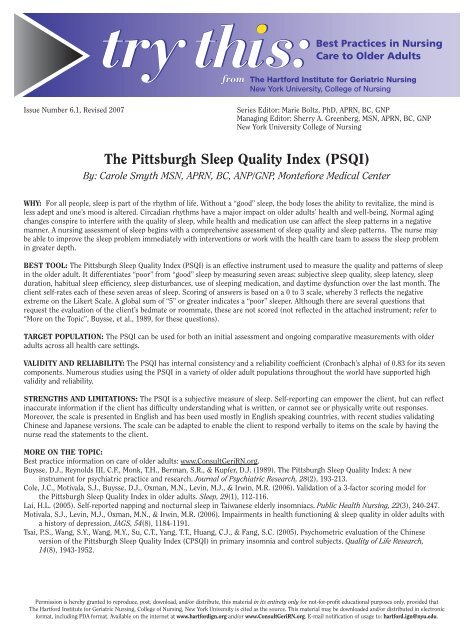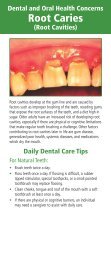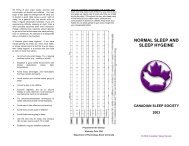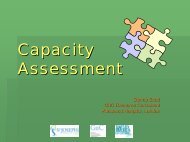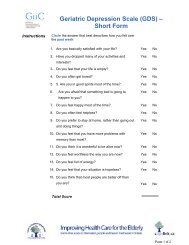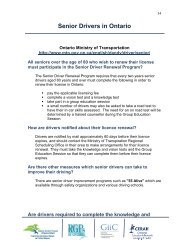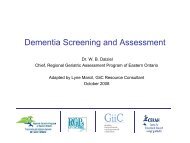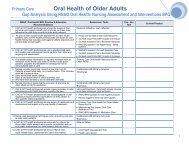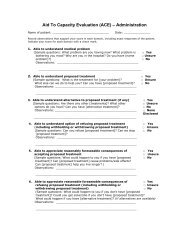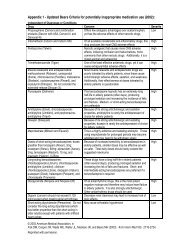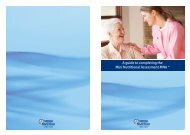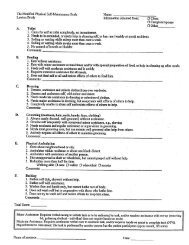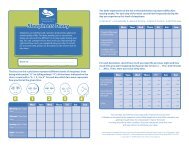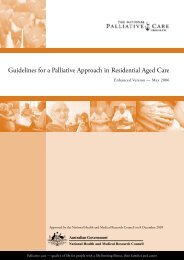The Pittsburgh Sleep Quality Index (PSQI)
The Pittsburgh Sleep Quality Index (PSQI)
The Pittsburgh Sleep Quality Index (PSQI)
- No tags were found...
You also want an ePaper? Increase the reach of your titles
YUMPU automatically turns print PDFs into web optimized ePapers that Google loves.
Issue Number 6.1, Revised 2007Series Editor: Marie Boltz, PhD, APRN, BC, GNPManaging Editor: Sherry A. Greenberg, MSN, APRN, BC, GNPNew York University College of Nursing<strong>The</strong> <strong>Pittsburgh</strong> <strong>Sleep</strong> <strong>Quality</strong> <strong>Index</strong> (<strong>PSQI</strong>)By: Carole Smyth MSN, APRN, BC, ANP/GNP, Montefiore Medical CenterWHY: For all people, sleep is part of the rhythm of life. Without a “good” sleep, the body loses the ability to revitalize, the mind isless adept and one’s mood is altered. Circadian rhythms have a major impact on older adults’ health and well-being. Normal agingchanges conspire to interfere with the quality of sleep, while health and medication use can affect the sleep patterns in a negativemanner. A nursing assessment of sleep begins with a comprehensive assessment of sleep quality and sleep patterns. <strong>The</strong> nurse maybe able to improve the sleep problem immediately with interventions or work with the health care team to assess the sleep problemin greater depth.BEST TOOL: <strong>The</strong> <strong>Pittsburgh</strong> <strong>Sleep</strong> <strong>Quality</strong> <strong>Index</strong> (<strong>PSQI</strong>) is an effective instrument used to measure the quality and patterns of sleepin the older adult. It differentiates “poor” from “good” sleep by measuring seven areas: subjective sleep quality, sleep latency, sleepduration, habitual sleep efficiency, sleep disturbances, use of sleeping medication, and daytime dysfunction over the last month. <strong>The</strong>client self-rates each of these seven areas of sleep. Scoring of answers is based on a 0 to 3 scale, whereby 3 reflects the negativeextreme on the Likert Scale. A global sum of “5” or greater indicates a “poor” sleeper. Although there are several questions thatrequest the evaluation of the client’s bedmate or roommate, these are not scored (not reflected in the attached instrument; refer to“More on the Topic”, Buysse, et al., 1989, for these questions).TARGET POPULATION: <strong>The</strong> <strong>PSQI</strong> can be used for both an initial assessment and ongoing comparative measurements with olderadults across all health care settings.VALIDITY AND RELIABILITY: <strong>The</strong> <strong>PSQI</strong> has internal consistency and a reliability coefficient (Cronbach’s alpha) of 0.83 for its sevencomponents. Numerous studies using the <strong>PSQI</strong> in a variety of older adult populations throughout the world have supported highvalidity and reliability.STRENGTHS AND LIMITATIONS: <strong>The</strong> <strong>PSQI</strong> is a subjective measure of sleep. Self-reporting can empower the client, but can reflectinaccurate information if the client has difficulty understanding what is written, or cannot see or physically write out responses.Moreover, the scale is presented in English and has been used mostly in English speaking countries, with recent studies validatingChinese and Japanese versions. <strong>The</strong> scale can be adapted to enable the client to respond verbally to items on the scale by having thenurse read the statements to the client.MORE ON THE TOPIC:Best practice information on care of older adults: www.ConsultGeriRN.org.Buysse, D.J., Reynolds III, C.F., Monk, T.H., Berman, S.R., & Kupfer, D.J. (1989). <strong>The</strong> <strong>Pittsburgh</strong> <strong>Sleep</strong> <strong>Quality</strong> <strong>Index</strong>: A newinstrument for psychiatric practice and research. Journal of Psychiatric Research, 28(2), 193-213.Cole, J.C., Motivala, S.J., Buysse, D.J., Oxman, M.N., Levin, M.J., & Irwin, M.R. (2006). Validation of a 3-factor scoring model forthe <strong>Pittsburgh</strong> <strong>Sleep</strong> <strong>Quality</strong> <strong>Index</strong> in older adults. <strong>Sleep</strong>, 29(1), 112-116.Lai, H.L. (2005). Self-reported napping and nocturnal sleep in Taiwanese elderly insomniacs. Public Health Nursing, 22(3), 240-247.Motivala, S.J., Levin, M.J., Oxman, M.N., & Irwin, M.R. (2006). Impairments in health functioning & sleep quality in older adults witha history of depression. JAGS, 54(8), 1184-1191.Tsai, P.S., Wang, S.Y., Wang, M.Y., Su, C.T., Yang, T.T., Huang, C.J., & Fang, S.C. (2005). Psychometric evaluation of the Chineseversion of the <strong>Pittsburgh</strong> <strong>Sleep</strong> <strong>Quality</strong> <strong>Index</strong> (C<strong>PSQI</strong>) in primary insomnia and control subjects. <strong>Quality</strong> of Life Research,14(8), 1943-1952.Permission is hereby granted to reproduce, post, download, and/or distribute, this material in its entirety only for not-for-profit educational purposes only, provided that<strong>The</strong> Hartford Institute for Geriatric Nursing, College of Nursing, New York University is cited as the source. This material may be downloaded and/or distributed in electronicformat, including PDA format. Available on the internet at www.hartfordign.org and/or www.ConsultGeriRN.org. E-mail notification of usage to: hartford.ign@nyu.edu.
<strong>The</strong> <strong>Pittsburgh</strong> <strong>Sleep</strong> <strong>Quality</strong> <strong>Index</strong> (<strong>PSQI</strong>)Instructions: <strong>The</strong> following questions relate to your usual sleep habits during the past month only. Your answers shouldindicate the most accurate reply for the majority of days and nights in the past month. Please answer all questions.During the past month,1. When have you usually gone to bed? ___________________2. How long (in minutes) has it taken you to fall asleep each night? ___________________3. When have you usually gotten up in the morning? ___________________4. How many hours of actual sleep do you get at night? (This may be different than the number of hoursyou spend in bed) ___________________5. During the past month, how often have you hadtrouble sleeping because you…a. Cannot get to sleep within 30 minutesb. Wake up in the middle of the night or early morningc. Have to get up to use the bathroomd. Cannot breathe comfortablye. Cough or snore loudlyf. Feel too coldg. Feel too hoth. Have bad dreamsi. Have painj. Other reason(s), please describe, including how often youhave had trouble sleeping because of this reason(s):Not duringthe pastmonth (0)Less thanonce aweek (1)Once ortwice aweek (2)Three ormore timesa week (3)6. During the past month, how often have you taken medicine(prescribed or “over the counter”) to help you sleep?7. During the past month, how often have you had trouble stayingawake while driving, eating meals, or engaging in social activity?8. During the past month, how much of a problem has it been foryou to keep up enthusiasm to get things done?Verygood (0)Fairlygood (1)Fairlybad (2)Verybad (3)9. During the past month, how would you rate your sleepquality overall?Component 1 #9 Score . . . . . . . . . . . . . . . . . . . . . . . . . . . . . . . . . . . . . . . . . . . . . . . . . . . . . . . . . . . . . . . . . . . . . . . .C1_______Component 2 #2 Score (≤15min=0; 16-30 min=1; 31-60 min=2, >60 min=3) + #5a Score(if sum is equal 0=0; 1-2=1; 3-4=2; 5-6=3) . . . . . . . . . . . . . . . . . . . . . . . . . . . . . . . . . . . . . . . . . . . . .C2_______Component 3 #4 Score (>7=0; 6-7=1; 5-6=2; 85%=0, 75%-84%=1, 65%-74%=2,


